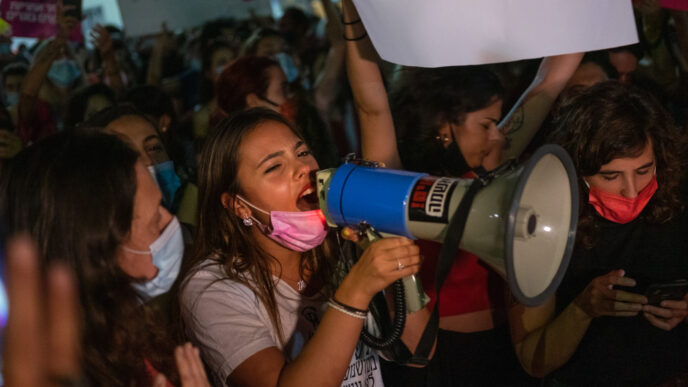
In the last weeks, a case of a gang rape of a 16-year-old girl in the southern resort town of Eilat has caused shockwaves all over Israel. In addition to shock, disgust and anger, the incident has sparked many protests against rape culture and in solidarity with the victim, and prompted a renewed effort toward education on healthy sexuality.
"It happened on our watch and it's a very difficult thing," said Shachar Rumney, 32, an educator who leads sexuality and gender workshops as part of the program “LeGaat B’Zeh” (Touching On It). "It's about using force, violence and relationships. It's their conscious choice not to ask themselves questions, to look at sex as something that 'I deserve', that I should achieve at the expense of women. Those who were there and did these acts chose to ignore and close off their hearts. It is a choice to do an act that is evil, it is a value judgment, and in the case of adults, this act is all the more serious."
“Stop Everything You’re Doing and Take to the Streets”
September 2nd, the day the indictment was released, saw a number of protests to show solidarity with the victim and condemning acts of this kind. At noon, workplaces organized temporary strikes, and in the evening demonstrations and protests occurred around the country.
On the event's page on Facebook, the organizers wrote: "12:00 – Bring something red with you. Stop working. Disrupt through inaction. Another girl was raped, bloodshed of women in this country is permitted. We must not continue to move onto the next item on the agenda. Every day women are murdered, raped, assaulted – it's time to take to the streets. Stop everything you’re doing and take to the streets or the nearby intersection.“
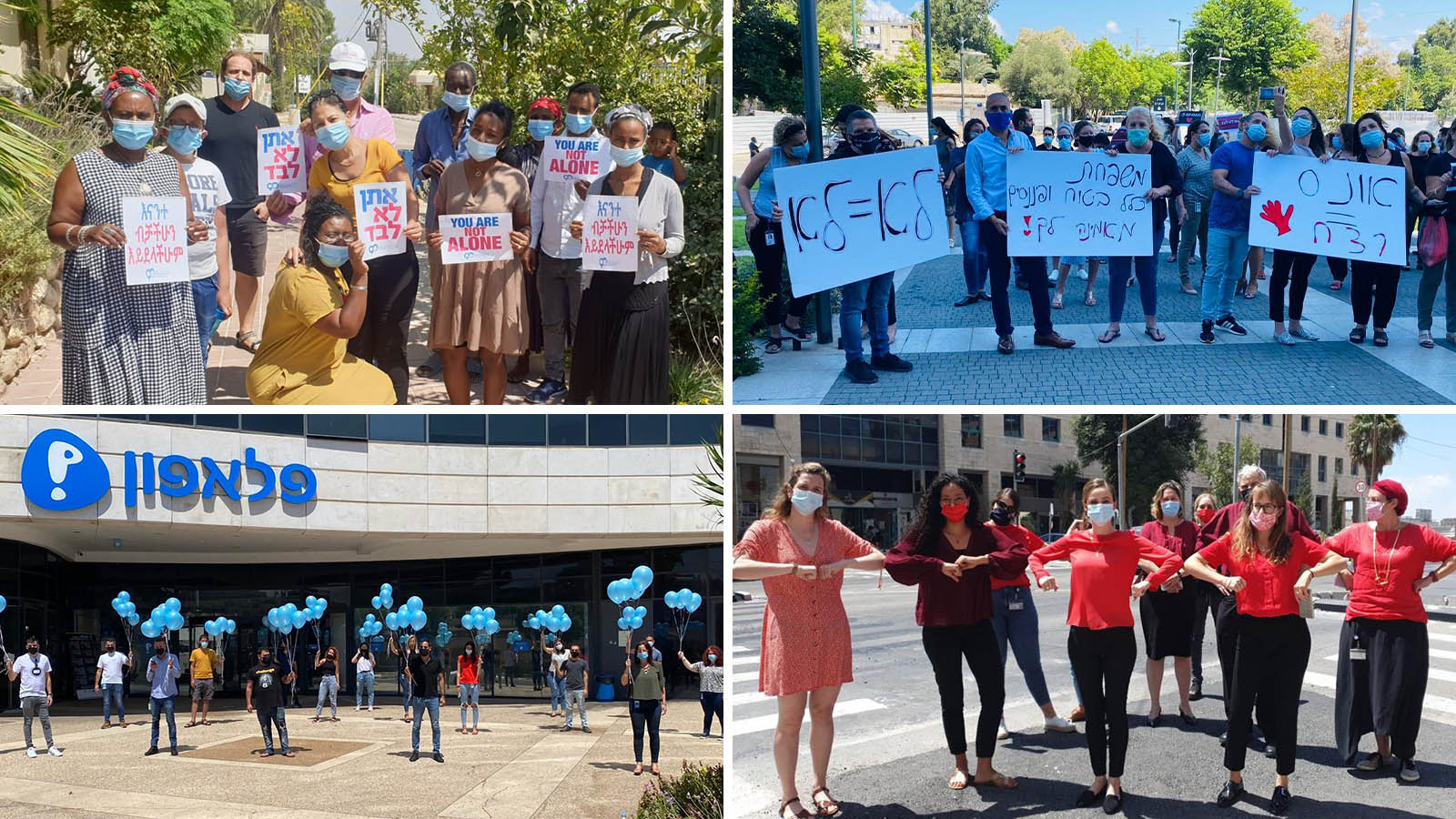
Many companies, including major phone companies Pelephone, Yes and Bezeq International, went on strike at noon. Customers calling into the service and sales centers received voice message that "the company identifies with the fight to prevent violence against women, we will return to full activity at 12:15."
In addition, Israel’s electricity provider stopped its activities for 10 minutes in solidarity. A letter circulated by the company's CEO Ofer Bloch told the company's employees that "our commitment these days is twofold and even threefold: as men, women and parents of children and we have a crucial influence on shaping the future generation, as well as refining the messages and meaning of the word 'no.'"
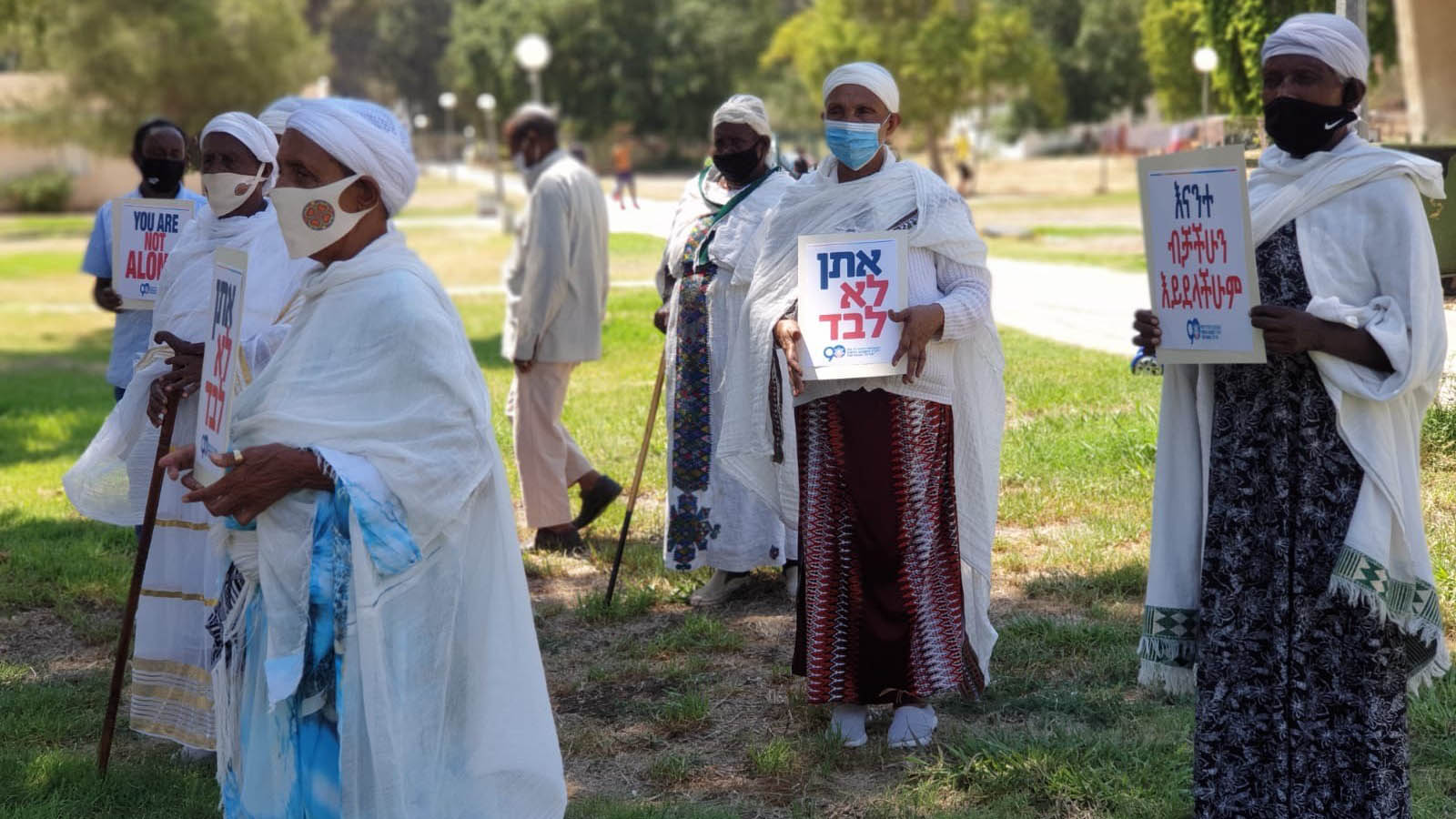
Employees of the Jewish Agency and the World Zionist Organization, including shlichim posted around the world, demonstrated against the act of violence. At the Jewish Agency's absorption centers throughout the country, new immigrants held signs reading “you are not alone.” Jerusalem’s municipality held a protest at noon, and the Tel Aviv municipality organized extensive outreach activities for thousands of its employees, which included lectures and workshops on the subject.
“Not in Our Schools”
Despite the public denunciations of the rape, an incident was reported in Kfar Saba only a number of days later, where twelfth-graders expressed encouragement for rape. Graffiti and signs were found outside two of the city’s high schools reading: "There is no tenth grader who does not put out, there is no twelfth grader who does not receive," and "Ayia Napa – 12, Eilat – 30, twelfth graders – 100.” Ayia Napa refers to a 2019 case in Cyprus, where a British woman accused 12 Israeli men of rape.
On September 8th, the city’s parents’ committees led a protest outside Rabin and Katznelson schools, where students chanted "silence is not consent, silence = paralysis," "no is no," and "deal with the root issue, don’t just suspend.” The suspected perpetrators of the signs have been suspended from schools, but students demanded a further-reaching response.
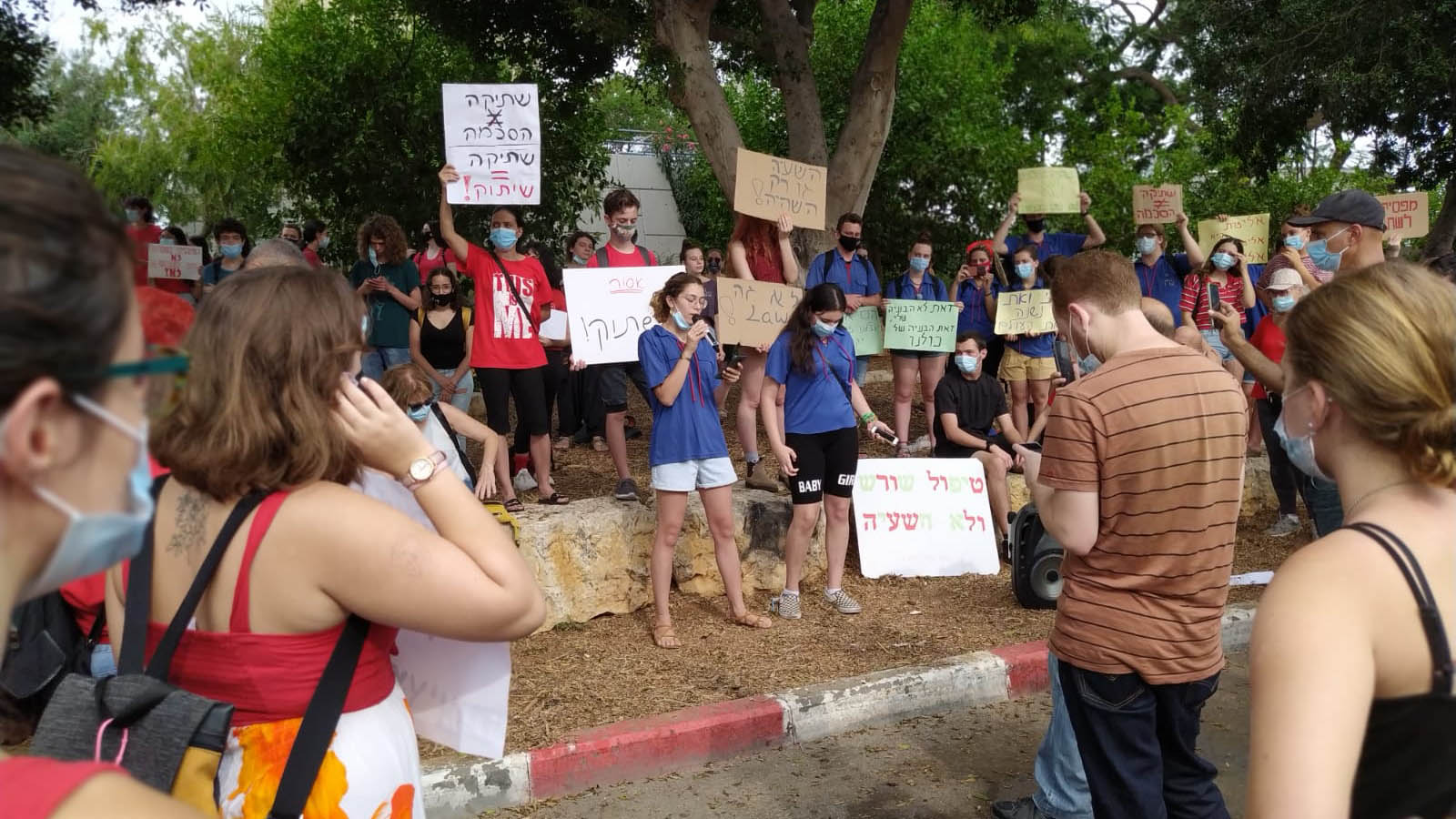
The chairman of the city's parent committee said at the demonstration: “It all starts from home. We must draw the line emphatically and say – not in our schools. It begins with a comprehensive clarification and includes proper punishment. Ultimately, we must have fundamental education toward gender equality and healthy and respectful sexuality. There is a systemic problem here."
The mayor of Kfar Saba, Rafi Saar, published a post in which he condemned the signs and graffiti: "This is degrading behavior, deviating from any good judgment, behavior without thought. These are not just signs, let me make that clear! This is an inability to discern boundaries, exactly what has happened in recent cases across the country. Complex educational attention will be paid to this throughout the year."
Tackling Rape Culture with Teenagers and their Parents
Education around sexual violence, and more importantly, fostering a positive, healthy and nonviolent sexuality among teenagers, has recently risen to the top of the agenda. After the Ayia Napa case, a project called “100% Responsibility” was created, with the aim of providing parents and educators with tools for talking to children and teenagers about sexuality. The project was attended by more than 10,000 parents and educators who participated in about 250 lectures throughout the country. In recent weeks following the incident in Eilat, the project has resumed, and according to Marganit Erez, one of the organizers, "the goal of the lectures, today, as then, is to stop and give parents tools to talk to their children."
"100% Responsibility" is one example of how the educational discourse on gender and sexuality has developed in recent years. Cases such as the rape case in Cyprus and the Eyal Golan case, highlight the need for education for children and their parents in an attempt to shed light on what is known as "rape culture" – a term that emphasizes the connection between sexual violence in society and culture, which is expressed in ignoring and forgiveness towards cases of sexual assault and even in encouragement of acts of sexual violence.
"It is important to have a conversation with boys about everything related to the concept of rape culture,” said Rumney, who has been leading sex and gender education workshops in schools and informal settings for the past six years. “It really is a culture and it is a very broad thing. It is expressed in the messages that boys learn from an early age, in the 'script' that they have to adopt in order to be men, and in how they have to feel and look."
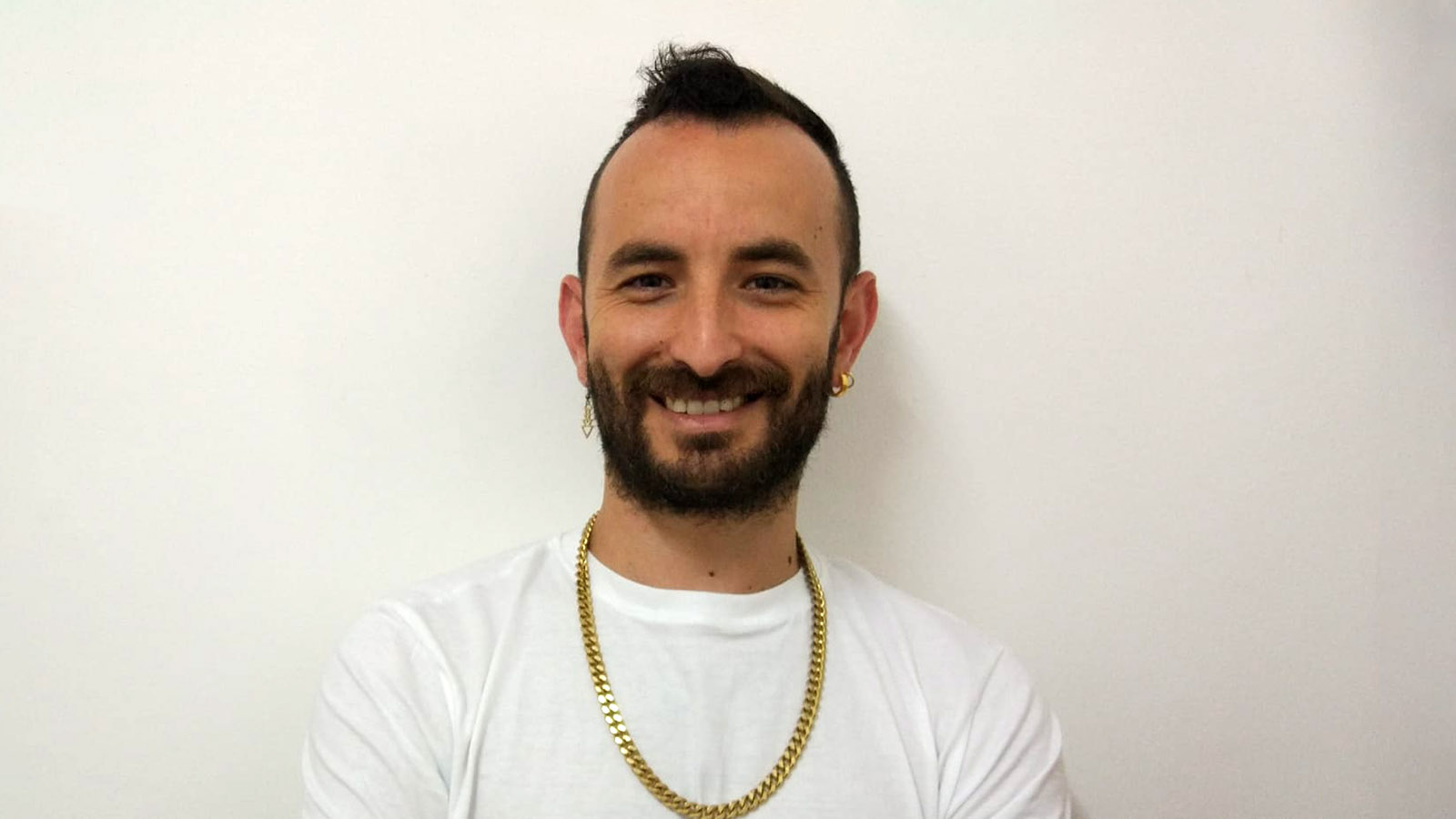
According to him, something that stands out in his encounters with the boys, are the expectations that they have to deal with in the process of their adolescence.
"No one is born to be a man," he said, “but boys adopt a set of traits. Assertiveness, confidence, and a very limited set of tools for solving problems, mostly through the use of force. Difficulty dealing with situations where I do not know what is happening or what I feel and a tendency to break down such situations through making very clear decisions about who I am and what I am."
"A boy realizes very quickly that he needs to want sex, and if he does not want to, there is a problem with him. In that, watching porn plays a very important role. Children and teenagers today are exposed to porn not only by choice, but from the moment they have a smartphone,” Rumney said. “Boys absorb this content for a considerable number of years before they are in intimate contact with someone. They carry this baggage for a long time. However, the violence, humiliation, debasement and use of force seen in porn is an extreme of behaviors that are not only found in porn, they are also found in messages in popular culture. "
One of the challenges that Rumney described when he talks about educational workshops he has led, is to create a desire for a sexual encounter where the bottom line is not to "come out clean" in a criminal sense.
"When we meet with teens and talk to them about consent, desire, signs within sexual contact and communication, they come with a lot of embarrassment and a lot of difficulty being within that conversation, and with a sense that they might be accused of something. It's important for them to know the legal structure. How to 'dodge'. How can I not be responsible? To be able to meet the boys at these points, you really have to be with them in these fears," he said.
Rumney described many cases where a conversation about consent in physical touch develops into a conversation about "what she wants and what she did."
"I tell them that this is not a wrong answer, but that it is an evasive answer. I ask them what is right in their eyes. Let them stop for a moment and say if he thinks it is good for him and whoever is with him. Try to shed the cynicism and say if in your opinion, it is a good physical encounter,” Rumney said. “I see more and more boys talking less 'about' her and more about themselves and how they identify points where there is no consent and desire. In the process, I see how they manage to say things to each other and give tips for clarifying consent and desire."
"When you give them tools, they say 'Actually, yeah. I was in a situation where I might have behaved differently.’ I think talking about these things in an appropriate way already at the ages of the beginning of middle school is a very significant thing."
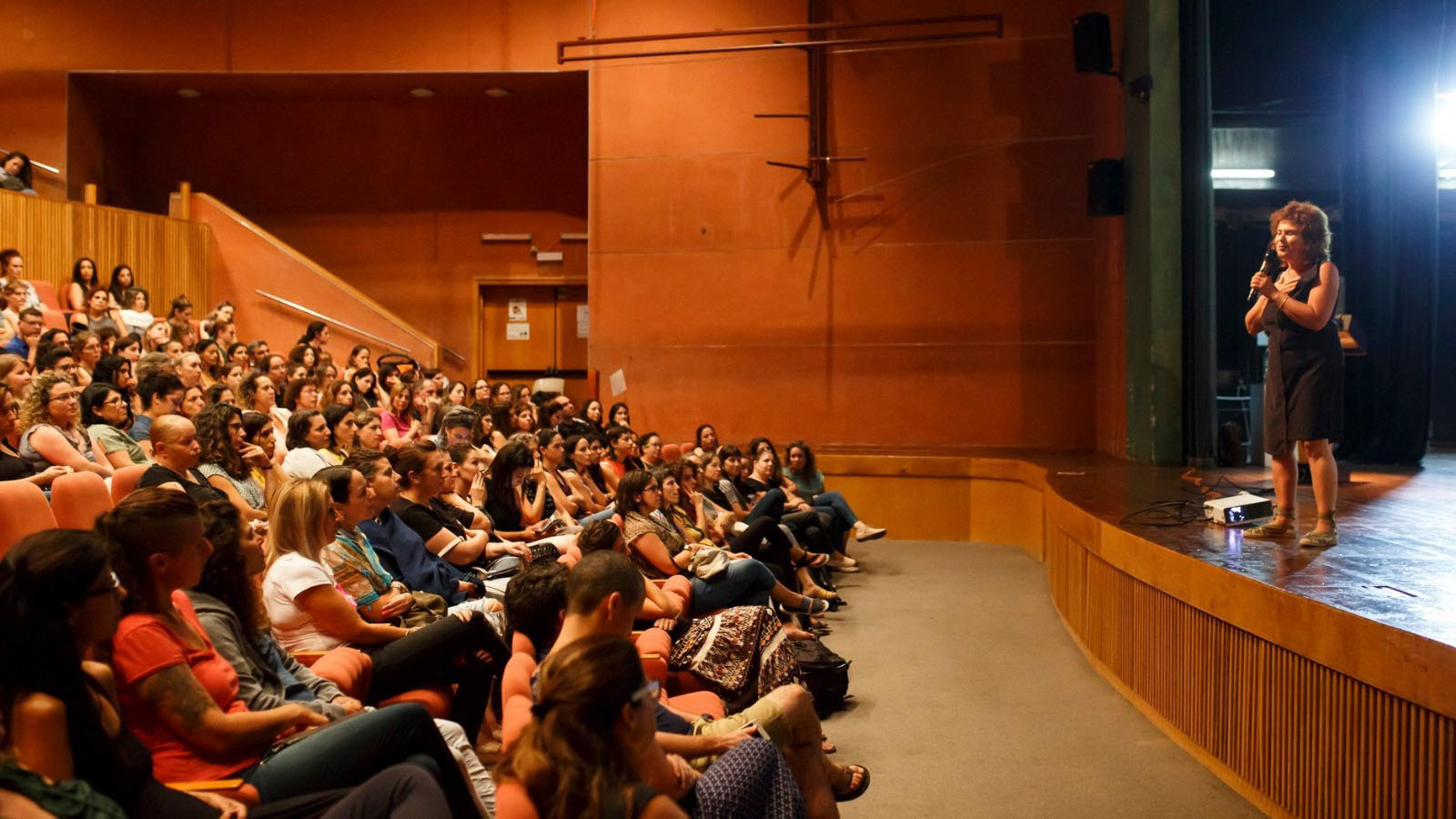
"We found that parents are helpless," said Erez, who has been involved in healthy sexuality education for about 14 years. "Parents of boys are afraid that their sons will harm and parents of girls are afraid that they will be harmed. In the ‘100% Responsibility’ project. we said, let's see what we do to stop this behavior and that is what motivates us even now. There is a very great helplessness. We want to tell parents – this is how you can talk so that the children will listen to you.”
"The starting point is to recognize the stormy period that teens are in. Recognize the awakening of sexuality, social pressure, difficulty coping. Do not judge them, come at eye level. Then strengthen their internal resources, develop the ability to listen to themselves in the face of stress when everyone is standing in line,” she said. “Teach them to ask the right questions, what is right for me, what I think. Make sure there’s a question mark. Teach them to stop and check what their body is feeling, tense or relaxed, teach them that they have legitimacy to say no, and also to say yes. It does not suit me, I do not agree, I don’t want you to touch my body, and even if I started, I am always allowed to stop."
According to Erez, parents are no less embarrassed than children and teenagers.
"Parents should also be given legitimacy to be embarrassed. Last year 10,000 parents came to our workshops from all over the country. The parents' need is very great. The feeling that we are all in the same boat, no one talked to us about this issue, so how do we know to talk about it? We live in a culture where it is not customary to talk about sexuality. A code of silence is established here, and the media are the ones that educate about it. If we want to make social change, we must talk about it."
Took turns raping the victim
On September 2, the Southern District Attorney’s office filed indictments against 11 people, out of around 30 initial people suspected of lining up outside a room at the Red Sea Hotel in Eilat to take turns raping the victim. These include Ilizir Meirov (27) and Isi Rafaelov (27) from Hadera, both with previous criminal records, and Osher Shlomo (19) from Moshav Noga, as well as eight minors, including 17-year-old twin brothers from the south of the country. They were indicted for offenses including rape under aggravated circumstances, aiding and abetting rape under aggravated circumstances, indecent assault, failure to prevent a crime, invasion of privacy, and more.
The indictment alleged that those involved treated the complainant as an object, as a tool to satisfy their desires, and that none of the defendants tried to stop what was happening and provide the girl with any help. The girl, under the influence of alcohol, was unable to make decisions or provide consent. Rafaelov approached the girl under the guise of offering medical assistance, and instead brought her to the hotel room where he remained and even videotaped as the acts were perpetrated.
The Association of Centers for Assistance to Victims of Sexual Assault released a statement reading: “The disgusting acts described in the indictment speak for themselves. Rape is a heinous and serious act even when it is committed by one person, but the thought of the number of young people, mostly minors, who chose to join the rape, requires Israeli society to do a soul-searching. These boys are among us. They grew up, within our society and from our society.“
“This affair should shock the Ministry of Education, which cannot continue to abandon education for healthy sexuality, with an emphasis on preventing harm and bystanders. Shomrat, Ramat Hasharon, Ayia Napa, Eilat, and hundreds and thousands more gang rape cases that have reached aid centers over the years prove the urgency of the problem,” their statement continued. “Most of the victims of gang rape are girls, and until we change something substantial, the next case is only a matter of time. We stand behind the victim, who has shown and will continue to need tremendous strength and courage. The rehabilitation process is just beginning, and we will continue to accompany and support it as needed."






